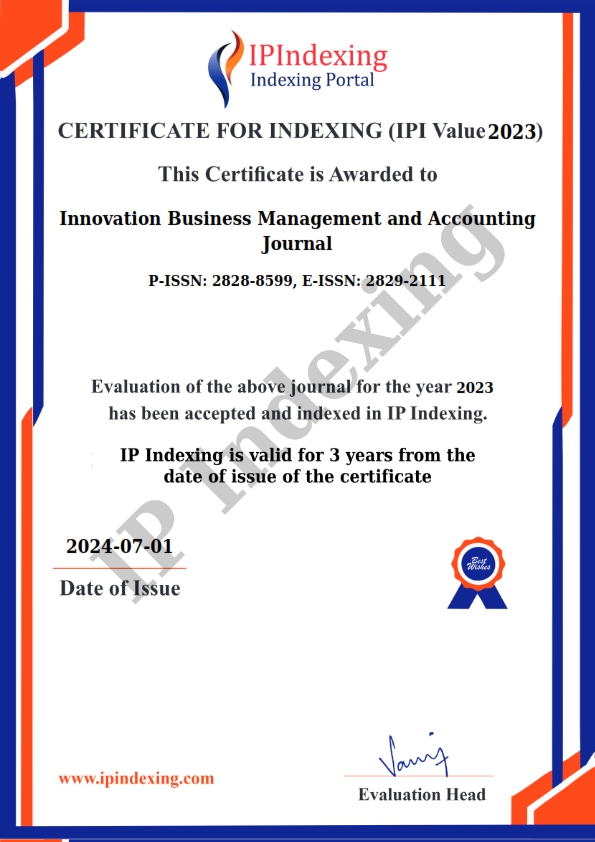Impact of Social Interaction and Knowledge Management on Job Satisfaction Mediated by Organizational Citizenship Behavior
DOI:
https://doi.org/10.56070/ibmaj.2025.002Keywords:
Job Satisfaction, Knowledge Management, Organizational Citizenship Behavior, Social InteractionAbstract
This study aims to analyze the influence of social interaction and knowledge management on job satisfaction, with Organizational Citizenship Behavior (OCB) as a mediating variable among employees of BCA Bank in East Java in 2024. The research employs a quantitative approach, using primary data collected through an online questionnaire from 99 respondents. Data analysis was conducted using Partial Least Squares (PLS) to examine the relationships between variables. The findings reveal that social interaction has a significant direct effect on job satisfaction, underscoring the importance of communication and collaboration among employees in fostering a positive work environment. Conversely, knowledge management does not exhibit a significant impact on job satisfaction, either directly or indirectly through OCB, indicating that the knowledge management strategies currently implemented are suboptimal. Furthermore, OCB fails to mediate the relationship between social interaction and knowledge management with job satisfaction. The conclusion of this study highlights the importance of adopting a more strategic approach focused on strengthening social interactions and optimizing knowledge management to enhance job satisfaction. This research offers practical implications for human resource management to cultivate a more collaborative work culture and support OCB behavior, ultimately improving employee productivity and overall well-being.
Downloads
References
Avey, J. B., Reichard, R. J., Luthans, F., & Mhatre, K. H. (2011). Meta‐analysis of the impact of positive psychological capital on employee attitudes, behaviors, and performance. Human resource development quarterly, 22(2), 127-152. https://doi.org/10.1002/hrdq.20070
Azeem, M., Ahmed, M., Haider, S., & Sajjad, M. (2021). Expanding competitive advantage through organizational culture, knowledge sharing and organizational innovation. Technology in Society, 66, 101635. https://doi.org/10.1016/j.techsoc.2021.101635
Bock, G. W., & Kim, Y. G. (2002). Breaking the myths of rewards: An exploratory study of attitudes about knowledge sharing. Information Resources Management Journal (IRMJ), 15(2), 14-21. https://doi.org/10.4018/irmj.2002040102
Davenport, T. H. (1998). Working knowledge: How organizations manage what they know. NewYork Harvard Business School.
Dessler, G. (2020). Fundamentals of human resource management. Pearson.
Fanggidae, J. P. (2019). Relationships between advertising value and dimensions of advertising: A case of television advertising of GSM providers in Indonesia. The International Journal of Social Sciences World (TIJOSSW), 1(1), 48-57. https://www.growingscholar.org/journal/index.php/TIJOSSW/article/view/8
Folger, J. P., Poole, M. S., & Stutman, R. K. (2021). Working through conflict: Strategies for relationships, groups, and organizations. Routledge.
Kumari, P., & Thapliyal, S. (2017). Studying the impact of organizational citizenship behavior on organizational effectiveness. Human Resource Management, 4(1), 9-21.
Lee, H., & Chang, W. (2022). Exploring the Mediating Role of OCB in Knowledge Management and Job Satisfaction. Journal of Organizational Behavior Studies, 9(1), 67–84.
Locke, E. A., King, E. B., & Cortina, J. M. (1976). Industrial and organizational psychology.
Nonaka, I., & Takeuchi, H. (2019). The wise company: How companies create continuous innovation. Oxford University Press.
Nurjanah, S., Pebianti, V., & Handaru, A. W. (2020). The influence of transformational leadership, job satisfaction, and organizational commitments on Organizational Citizenship Behavior (OCB) in the inspectorate general of the Ministry of Education and Culture. Cogent Business & Management, 7(1), 1793521. https://doi.org/10.1080/23311975.2020.1793521
Ocampo, L., Acedillo, V., Bacunador, A. M., Balo, C. C., Lagdameo, Y. J., & Tupa, N. S. (2018). A historical review of the development of organizational citizenship behavior (OCB) and its implications for the twenty-first century. Personnel Review, 47(4), 821-862. https://doi.org/10.1108/PR-04-2017-0136
Paredes-Saavedra, M., Vallejos, M., Huancahuire-Vega, S., Morales-García, W. C., & Geraldo-Campos, L. A. (2024). Work Team Effectiveness: Importance of Organizational Culture, Work Climate, Leadership, Creative Synergy, and Emotional Intelligence in University Employees. Administrative Sciences, 14(11), 280. https://doi.org/10.3390/admsci14110280
Park, E. S., Yang, S. B., & Park, A. (2023). The Impact of Autonomous Virtual Work Envir-onments on Job Satisfaction and Organizational Effectiveness. Asia Pacific Journal of Information Systems, 33(4), 1043-1057.
Podsakoff, P. M., MacKenzie, S. B., & Podsakoff, N. P. (Eds.). (2018). The Oxford handbook of organizational citizenship behavior. Oxford University Press.
Pooja, A. A., De Clercq, D., & Belausteguigoitia, I. (2016). Job stressors and organizational citizenship behavior: The roles of organizational commitment and social interaction. Human Resource Development Quarterly, 27(3), 373-405. https://doi.org/10.1002/hrdq.21258
Rastogi, A. K. P. G. R. (2013). Employee engagement and organizational effectiveness: The role of organizational citizenship behavior. The Business Management Review, 8(4), 129-136.
Robbins, S. P., & Judge, T. A. (2018). Essentials of organizational behavior. pearson.
Saepudin, U., & Djati, S. P. (2019). Pengaruh Kepuasan Kerja Terhadap Organizational Citizenship Behavior (OCB) Guru Dengan Komitmen Organisasional Sebagai Variabel Mediasi. Jurnal Ilmiah Bisnis, Pasar Modal Dan UMKM, 2(1), 123-136.
Torres, A. I., Ferraz, S. S., & Santos-Rodrigues, H. (2018). The impact of knowledge management factors in organizational sustainable competitive advantage. Journal of Intellectual Capital, 19(2), 453-472. https://doi.org/10.1108/JIC-12-2016-0143
Tuan, T. L. (2017). Knowledge sharing in public organizations: The roles of servant leadership and organizational citizenship behavior. International Journal of Public Administration, 40(4), 361-373. https://doi.org/10.1080/01900692.2015.1113550
Wang, S., & Noe, R. A. (2010). Knowledge sharing: A review and directions for future research. Human resource management review, 20(2), 115-131. https://doi.org/10.1016/j.hrmr.2009.10.001
Downloads
Published
How to Cite
Issue
Section
License
Copyright (c) 2025 Rofikul Amin, Roby Nur Akbar, Adi Suprayitno, Agus Haryono, Isman Isman, Mohamad Nur Singgih

This work is licensed under a Creative Commons Attribution-ShareAlike 4.0 International License.



